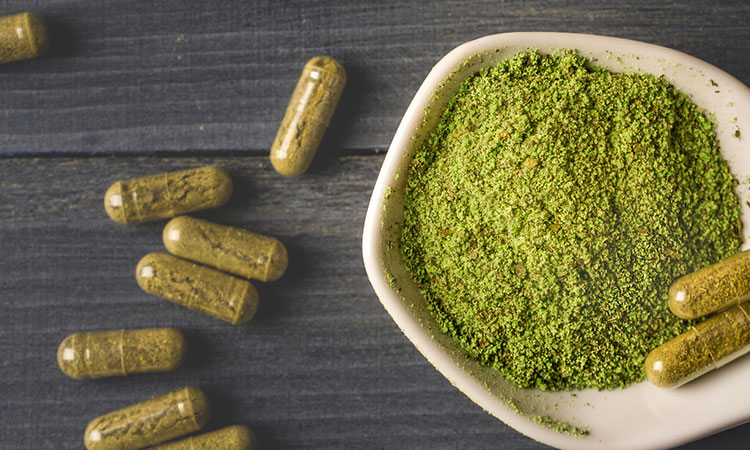
The kratom plant is a tall tropical tree originally from Southeast Asia, the Philippines, and New Guinea. Over 40 structurally related alkaloids have been isolated from the tree, in addition to flavonoids, terpenoid saponins, polyphenols, and glycosides. Two chemical components cause psychoactive euphoria: Mitragynine and 7-hydroxymitragynine. The leaves from the Kratom tree species called Mitragynine species of the Rubiaceae family are harvested to produce Kratom. Ultimately the drug-like effects come from Mitragynine, which is the core alkaloid.
Alkaloids are any class of nitrogenous organic compounds of plant origin that have pronounced physiological actions on humans .i.e.: morphine; and poisons: strychnine.
Why Is Kratom Addictive?
The chemicals in Kratom signal neurotransmitters that communicate with the brain’s reward pathway. The reward pathway is alerted to release dopamine and other natural feel-good body chemicals by organic means, such as eating chocolate, having sex, laughing. Or the reward pathway can be stimulated to release dopamine by a drug or chemical.
Sugar is a natural thing, but it is addictive and affects the reward pathway, just like drugs or alcohol, and people want more of it just like drugs. Kratom is addictive because it affects the brain and the reward pathway.
Kratom can cause effects similar to both opioids and stimulants. Two compounds in kratom leaves interact with opioid receptors in the brain when large amounts are consumed. (NIDA)
Is Kratom An Actual Opioid?
Today, the FDA lists Kratom as an opioid because of how the main chemicals mitragynine and 7-hydroxymitragynine affect the opioid receptors in the brain. People who abuse Kratom display symptoms that mirror opioid withdrawals, implying that it is opioid-like. The FDA states the following:
Notably, we recently conducted a novel scientific analysis using a computational model developed by agency scientists, which provided even stronger evidence of kratom compounds’ opioid properties. We also have learned more about deaths that involved kratom use and have identified additional adverse events related to this product. We have been especially concerned about the use of Kratom to treat opioid withdrawal symptoms, as there is no reliable evidence to support the use of Kratom as a treatment for opioid use disorder and significant safety issues exist. (FDA)
What Are The Effects of Kratom?
Essentially the effects of using Kratom depend on how much someone takes. They will feel awake and wired in small amounts, similar to coffee or a stimulant drug. They will feel relaxed and sedated at large doses, more like an opioid. Still, the effects are addictive. Whether a person wants to wake up or slow down, they use a drug to change how they feel. This is the heart of addiction to any substance.
Of course, some drugs are more potent and therefore more addictive. For example, sugar and caffeine are addictive, but they do not alter how someone feels and experience the outside world like Kratom or heroin, or cocaine.
What Does Kratom Addiction Look Like?
People who are abusing Kratom may develop a physical tolerance to the effects. If they are addicted, they will increase either use or amount to achieve the effects they enjoy. Like other drugs, a person who is abusing or addicted to Kratom will begin to prioritize having Kratom at all times. The other sign of Kratom addiction is withdrawal symptoms and other side effects from using too much. Some common physical symptoms that indicate abuse and or addiction to Kratom include:
- Runny nose, sweating.
- Muscle and bone aches
- Nausea, vomiting, diarrhea
- Rapid heart rate and hand tremors
- Stomach pain
- Headaches
- Delirium or hallucinations
Does River Walk Recovery Provide Treatment For Kratom Abuse and Addiction?
Here at River Walk Recovery, we have provided evidence-based forms of treatment for Kratom abuse and addiction. We invite you to reach out to one of our expert staff members to learn what programs are most effective for Kratom addiction.
We provide cognitive-behavioral therapy, holistic therapy, in-depth one-on-one counseling, and regular psychiatric assessments. All of our patients attend recovery-centered groups, mindfulness activities, and expert-led small groups on addiction to help our patients. We begin Kratom drug users in medically supervised detox and inpatient treatment or an intensive outpatient program.
Please don’t let Kratom ruin your health or life. We have the best team and programs that will support you. Call now to begin!
